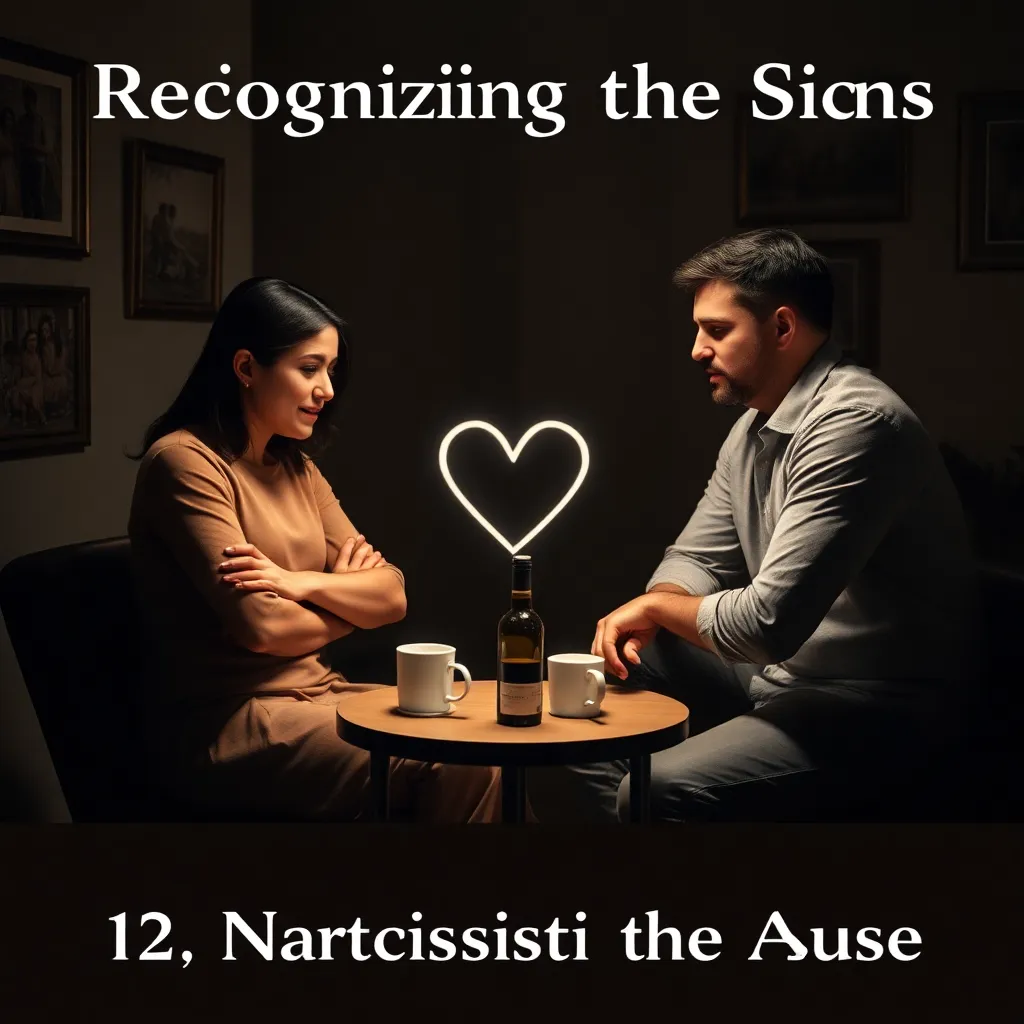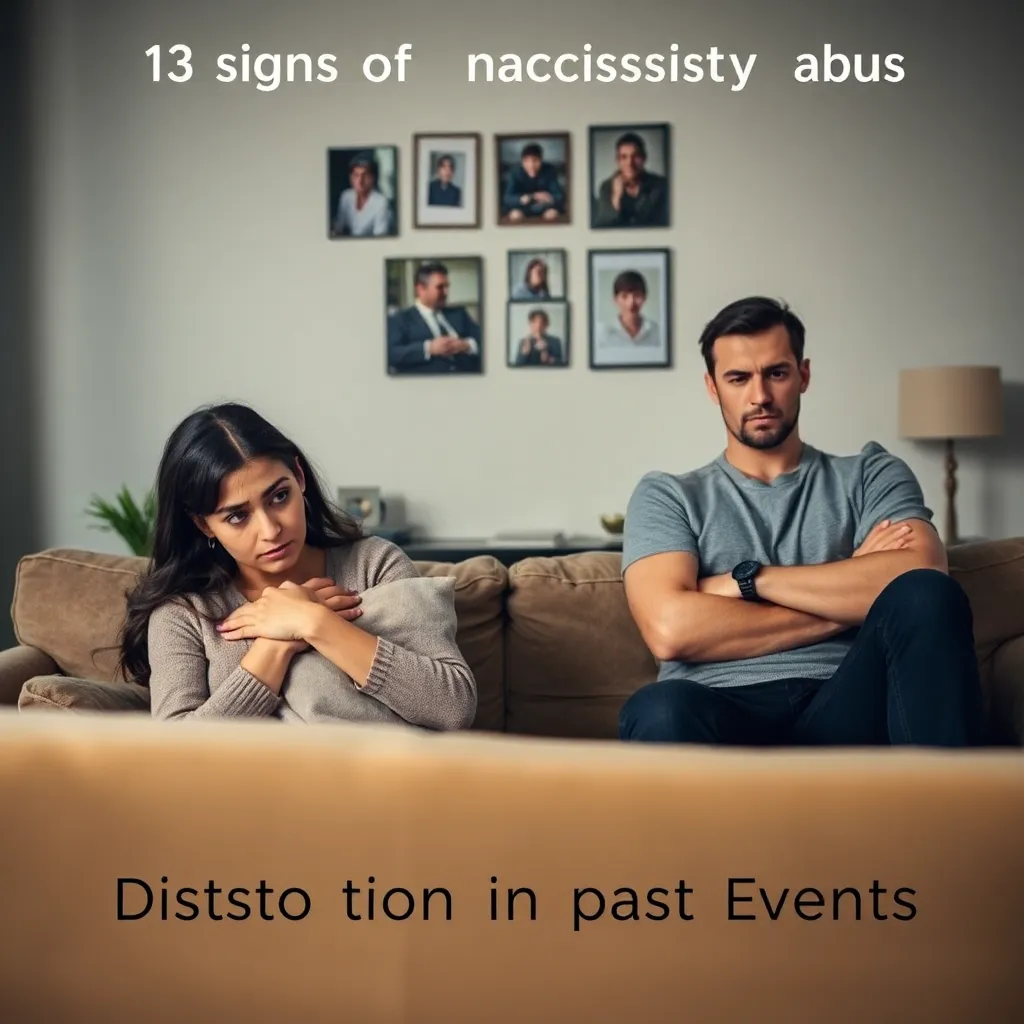Navigating relationships can sometimes feel like walking through a maze, and if you’ve ever found yourself questioning your reality, you might be facing more than just a rough patch. It’s a disconcerting experience, leaving you feeling isolated and confused, cradling the unsettling notion that something is amiss.
Understanding the signs of narcissistic abuse is crucial because it empowers you to reclaim your sense of self and trust in your perceptions. This journey is about recognizing the subtle manipulations that can undermine your confidence and peace of mind.
In this article, we will delve into 13 specific behaviors used to distort your reality, offering clarity and validation to those who have felt unseen and unheard. Our goal is to equip you with the knowledge and strength to identify and address these tactics, fostering a healthier, more authentic life.
1. Constant Dismissal of Feelings

In a relationship clouded by narcissistic abuse, a partner may constantly dismiss your feelings, making you question your own reality. You might express genuine concerns, only to be met with phrases like “You’re overreacting” or “It’s not a big deal,” which can leave you feeling invalidated and confused.
Imagine sharing your excitement about a personal achievement, and instead of celebration, your partner trivializes your success. This continuous dismissal sends a subtle yet powerful message that your emotions and experiences are not worthy of acknowledgment.
An expert insight suggests that this tactic is a form of manipulation designed to undermine your self-esteem. When your feelings are consistently belittled, it can lead to self-doubt, making it harder to trust your own perceptions and judgments.
Understanding that this behavior is part of a larger pattern of gaslighting can empower you to set boundaries and protect your emotional well-being. Remember, your feelings are valid and deserve to be heard, respected, and cherished.
2. Frequent Shifting of Blame

Narcissists often employ a tactic known as frequent shifting of blame, where they consistently redirect responsibility onto others. This can leave you feeling confused and guilty, as if you’re always at fault, no matter the situation.
Imagine a partner who constantly blames you for their bad moods, claiming it’s because of something you did or didn’t do. In reality, this is a classic example of emotional manipulation where the narcissist avoids taking accountability.
Experts suggest that identifying this pattern is key to regaining your emotional clarity. Once you recognize the behavior, you can start to set healthy boundaries and limit the impact of their blame games.
It’s crucial to remember that you are not responsible for their emotions or actions. By taking a step back, you can see that the problem lies in their refusal to accept responsibility, not in your behavior.
Ultimately, understanding this behavior can empower you to protect your emotional well-being and make informed decisions about your relationship. By recognizing and addressing these tactics, you take a significant step towards healthier interactions.
3. Manipulative Charm Offensive

In the realm of narcissistic abuse, a **manipulative charm offensive** is a tool often employed to confuse and control. This tactic involves using **excessive flattery** and affection, creating an illusion of a perfect partner, only to later withdraw it when you least expect it.
Imagine a partner who showers you with attention and gifts, only to disappear emotionally when you need them most. This behavior is designed to make you **doubt your own worth**, wondering what you did wrong to lose their favor.
Experts suggest that this charm is not genuine but rather a calculated strategy to keep you **emotionally invested** and dependent. By creating a cycle of highs and lows, the narcissist ensures you are constantly striving to regain their approval.
To counteract this manipulation, focus on cultivating your **self-worth** independently of your partner’s validation. Surround yourself with supportive friends and family who can provide a **grounded perspective** on your relationship dynamics.
4. Inconsistent Affection Patterns

In relationships marked by narcissistic abuse, you may notice an unsettling pattern of inconsistent affection. This behavior often leaves you feeling confused and second-guessing your own worth. One day, your partner might shower you with love and attention, making you feel like you’re the most important person in their world. The next day, they might turn cold and distant without any explanation. This erratic behavior is a deliberate tactic to keep you emotionally off-balance.
Imagine coming home after a long day to find your partner unusually distant, offering no explanation for their sudden change in mood. The cycle of warm gestures followed by cold detachment can make you feel like you’re walking on eggshells. Experts suggest that this pattern is a classic form of emotional manipulation, designed to foster a dependency on the abuser’s whims. Recognizing this behavior for what it is can be the first step towards regaining your emotional stability.
Another typical scenario involves your partner showering you with gifts and praise just after a particularly hurtful argument. This sudden shift from hostility to affection is often used to mask the abusive behavior and keep you tethered to the relationship. Over time, you may start to doubt your own perceptions, wondering if you are overreacting to their previous hurtful actions. It’s crucial to trust your instincts and acknowledge that these inconsistent patterns are not a reflection of your worth.
Ultimately, the key takeaway here is the importance of recognizing the signs of inconsistent affection and understanding its impact on your emotional well-being. By acknowledging these patterns, you can begin to reclaim your sense of self-worth and make strides towards healthier interactions. Remember, consistency in affection is a hallmark of a supportive and loving relationship.
5. Distortion of Past Events

In the tangled web of narcissistic abuse, a common tactic is the deliberate distortion of past events. This occurs when a narcissist insists that certain events happened differently than how you remember them, making you question your own reality. Imagine having a vivid memory of a joyful holiday, only to be told that it was filled with arguments and tension. Over time, these manipulations can erode your confidence in your own recollections.
Often, the narcissist will use these distorted memories to justify their behavior or actions. For instance, they might claim you agreed to something you never did, using it as a defense in current disagreements. Such tactics can leave you feeling confused and disoriented, as if the ground beneath you is constantly shifting. It’s a powerful tool for maintaining control and undermining your autonomy.
Recognizing this strategy involves trusting your own perceptions and seeking clarity when memories are challenged. Consulting with trusted friends or family can provide an external perspective, reinforcing the validity of your experiences. Documenting events soon after they occur can also help you maintain a grip on reality and defend against attempts to warp the truth.
Ultimately, being aware of the distortion of past events can empower you to set healthier boundaries. By recognizing these patterns, you can begin to reclaim your narrative and reinforce your sense of self. Remember, your experiences are valid, and you deserve to be heard and believed.
6. Undermining Personal Confidence

When someone is consistently undermining your personal confidence, it often begins subtly. You might notice seemingly small criticisms about your appearance, abilities, or choices that gradually erode your self-esteem. For example, a partner might offhandedly say, “Are you sure you want to wear that?” which can make you second-guess your own judgment.
Over time, these remarks can lead to a significant diminishment of self-worth. In a relationship, this can manifest through constant comparisons to others, suggesting you are “lucky” they are with you, as if you are not worthy of their time. This tactic ensures that you start to doubt every decision you make, seeking their validation as a crutch for your self-worth.
Expert insights suggest that this behavior is a tactic to maintain control by making you feel dependent on the abuser’s approval. By creating a dynamic where you question your ability to make sound decisions, the manipulator ensures you remain reliant on them for reassurance. This can lead to a cycle where you feel increasingly trapped, unable to trust your own instincts or opinions.
Real-world examples show that recovery is possible with the right support. Engaging in activities that remind you of your capabilities, such as hobbies or volunteering, can help rebuild the confidence that was undermined. Remember, recognizing these signs is an important step in breaking free from the cycle of narcissistic abuse.
7. Subtle Isolation Tactics

In many relationships, one partner may subtly begin to isolate the other from their support network. This often starts with seemingly innocent comments or requests, such as suggesting that a partner spends less time with friends or family under the guise of needing more “quality time” together.
Over time, these requests can snowball into more overt demands, gradually eroding the isolated partner’s social connections. The abuser may further manipulate the situation by implying that friends or family are a bad influence or do not have the best interests of the relationship at heart.
Such tactics can leave the isolated partner feeling increasingly alone and dependent on the abuser for emotional support. This isolation makes it easier for the abuser to control their partner and lessens the chances of interference from an external support system.
Experts note that this form of isolation is a hallmark of controlling behavior, which can be deeply damaging over time. It is crucial to recognize these signs early and seek to maintain individual friendships and family ties to ensure a balanced support system.
Feeling connected to others outside of the relationship can provide a crucial lifeline and perspective. By maintaining these connections, you protect your emotional well-being and enable a more balanced and mutually supportive relationship.
8. Erosion of Personal Boundaries

In a relationship affected by narcissistic abuse, the gradual erosion of personal boundaries can be deeply unsettling. You might find that your partner pushes against your limits, dismissing your discomfort as unreasonable or overreactive. This behavior often begins subtly, perhaps with minor invasions of privacy or disregarding your need for personal space. Over time, these incursions can escalate, leaving you feeling powerless and questioning your right to set boundaries at all.
Consider a scenario where your partner insists on checking your messages or emails under the guise of trust. Initially, you may comply to keep the peace, but this act can gradually wear down your sense of autonomy and privacy. This erosion is not just about controlling behavior—it’s about reshaping your reality to align with their needs and desires. As these boundaries blur, you might feel more isolated and less like your true self.
Experts in relationship dynamics often stress the importance of maintaining clear boundaries to protect your emotional health. Dr. Emily Johnson, a clinical psychologist, suggests that writing down your boundaries can serve as a powerful reminder of your needs and rights. This practice can help reinforce your sense of self, making it harder for someone to manipulate or dismiss your boundaries. Remember, reclaiming your boundaries is not just an act of defiance; it’s a step towards preserving your well-being and self-worth.
Ultimately, recognizing the erosion of personal boundaries is a critical step in breaking free from the cycle of narcissistic abuse. By understanding the tactics used to wear down these boundaries, you empower yourself to rebuild and protect them. In doing so, you pave the way for healthier, more respectful relationships that honor your individuality and strength.
9. Projection of Insecurities

In relationships marked by narcissistic abuse, the abuser often uses the projection of insecurities as a weapon. This involves attributing their own flaws and fears to their partner, making the victim feel responsible for issues that aren’t theirs to bear. Imagine a scenario where a partner accuses you of being unfaithful, despite their own history of infidelity. This is a classic case of projection, where the abuser’s own guilt is shifted onto you to create confusion and doubt.
Victims of projection often find themselves questioning their own reality and doubting their self-worth. Over time, this can lead to a harmful cycle where the victim internalizes the abuser’s insecurities as their own. It’s crucial to recognize these patterns early and trust your instincts about what you know to be true. Engaging in self-reflection and reaching out for support can be pivotal steps in reclaiming your confidence.
Experts suggest that understanding the underlying motivations for projection can be liberating. Narcissists project because they are unable to confront their own vulnerabilities, choosing instead to deflect them onto others. By identifying this tactic, you can start to draw clear boundaries and protect your mental health. Remember, their insecurities are not your burden to carry.
Empowering yourself with knowledge about projection can be a transformative step in navigating and healing from narcissistic abuse. This understanding allows you to separate your self-worth from the distorted narratives imposed by the abuser. Ultimately, recognizing projection is not just about defending against manipulation but also about reaffirming your own identity and self-assurance.
10. Invalidation of Your Experiences

In the shadow of narcissistic abuse, one often encounters the persistent invalidation of personal experiences. A partner may dismiss your feelings, leaving you questioning the reality of your emotions. For instance, when you express being hurt by something they said, they might respond with, “You’re overreacting,” making you doubt your own perceptions. This tactic is designed to undermine your confidence and make you rely on them for your sense of reality.
Consider a scenario where you share a significant achievement at work, only to be met with a lukewarm response or outright belittlement. Such reactions are not merely dismissive but are calculated to make you feel your achievements are insignificant. This invalidation can lead to a cycle of seeking validation from the very person causing harm. Realizing this pattern is the first step towards regaining control over your narrative.
Experts suggest that recognizing and naming these experiences can be a powerful tool in combating them. When you identify invalidation, remind yourself that your feelings and experiences are valid, regardless of another’s dismissal. Engaging with supportive friends or a therapist can reinforce your reality and help rebuild your confidence. This external support is crucial in providing a balanced perspective amidst the chaos.
Ultimately, validating your own experiences is not just an act of self-preservation but a declaration of your autonomy. It empowers you to trust your instincts and align with your inner truth. By acknowledging and valuing your own reality, you take a significant step toward healing and reclaiming your personal power.
11. Excessive Need for Control

In a relationship characterized by narcissistic abuse, an excessive need for control often manifests itself in subtle yet damaging ways. This control is enforced through manipulation, making you doubt your autonomy and decisions. Imagine a scenario where your partner insists on managing every aspect of your life, from your social interactions to your finances. Over time, this can lead to a loss of personal freedom, leaving you feeling trapped and disempowered.
Another common tactic used is micromanagement, where even minor choices are questioned or overridden. This might happen when your partner dictates what you should wear or how you should spend your free time. Such behaviors can undermine your confidence and make you reliant on their approval. Recognizing these signs is crucial for reclaiming your independence and self-worth.
Experts note that narcissists often use control to feed their own insecurities and maintain a sense of superiority. They may present their controlling behavior as a way of caring or protecting you. However, it is vital to distinguish between genuine concern and manipulative control. Understanding this distinction empowers you to set boundaries and assert your needs assertively.
It’s important to remember that a healthy relationship thrives on mutual respect and shared decision-making. Participating equally in decisions fosters a partnership where both parties feel valued and heard. If you find yourself in a situation where control is one-sided, consider seeking support from friends, family, or a professional to help navigate the challenges. Ultimately, prioritizing your autonomy and well-being is essential for a fulfilling and balanced relationship.
12. Twisting Words and Meanings

When a partner starts to twist your words or meanings, it can feel disorienting and confusing. Imagine explaining your feelings only to have them say, “That’s not what you meant,” leaving you questioning your own memory and perception.
Such behavior is a classic form of gaslighting, aimed at destabilizing your confidence. In these moments, maintaining a journal of your conversations and feelings can help you hold onto your reality, providing clarity amidst the chaos.
Experts suggest that those who twist words often do so to shift blame and avoid accountability. Recognizing this pattern can empower you to set boundaries, reminding yourself that your feelings and words are valid and deserve respect.
Ultimately, the goal of twisting words is to leave you feeling off-balance and uncertain. By staying grounded and seeking support from trusted friends or a therapist, you can reclaim your narrative and regain your confidence.
13. Creating Confusion and Doubt

When a partner consistently creates confusion and doubt, it can feel like standing in a fog without a clear path. They might make you question your own perceptions and memories, leaving you unsure of what actually happened.
Consider a situation where your partner insists they never agreed to a plan, despite your clear recollection of the conversation. In such scenarios, their constant contradictions may lead you to second-guess yourself and your ability to remember details correctly.
According to relationship experts, this technique is a classic form of gaslighting, aimed at keeping you off balance and under control. By causing you to doubt your own reality, they gain the upper hand, making it easier for them to manipulate your thoughts and actions.
To protect yourself, it’s essential to maintain clarity in your thoughts and feelings. Documenting interactions can be a powerful tool—keeping a journal or record of conversations helps reinforce your version of events and reduces confusion.
Ultimately, recognizing these tactics empowers you to reclaim your confidence and autonomy. By grounding yourself in your truth, you can navigate the relationship with greater awareness and strength.
Conclusion: Creating Beautiful Outdoor Spaces
In navigating the complex terrain of relationships, recognizing the signs of narcissistic abuse is crucial. This article has highlighted 13 critical concepts, including manipulative behaviors such as constant criticism, emotional withdrawal, and gaslighting tactics designed to distort your reality. By understanding these signs, you can begin to reclaim your sense of self and set healthy boundaries.
As an immediate next step, take a moment to reflect on your relationship dynamics. Identify any patterns that resonate with the signs discussed, and consider reaching out to a trusted friend or therapist for support. Doing so can provide you with the clarity and confidence needed to address these challenges head-on.
I encourage you to save or bookmark this article for future reference. Having this resource at your fingertips can serve as a vital tool in your journey toward healthier, more fulfilling relationships.
Looking ahead, remember that every step you take toward understanding and addressing unhealthy patterns is a step toward relationship success. Empower yourself with knowledge, take action with courage, and embrace the possibility of a future filled with genuine connection and mutual respect.
